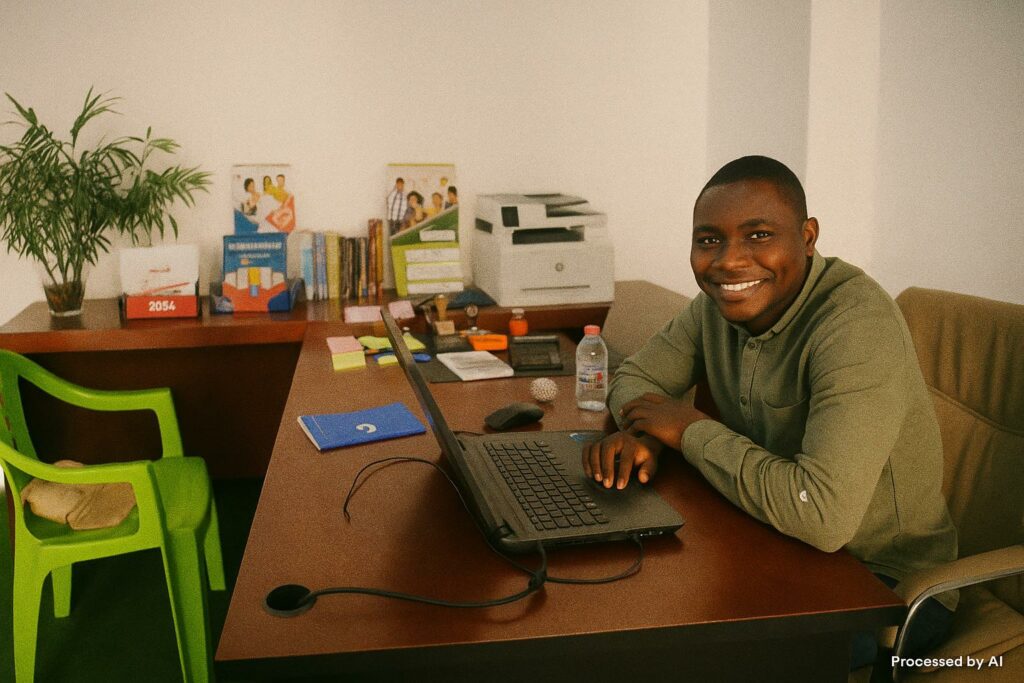A Turning Tide in Inclusive Skills Training
The low hum of computers in a modest classroom of southern Brazzaville tells a story rarely heard beyond the Congo River. Since 2022 the Centre de formation des jeunes vivant avec handicap, widely known as Cenfor-Jh, has enrolled cohorts of deaf students in accelerated digital courses designed to ease their transition into the city’s formal labour market. According to founder Edgar Bavoumina, the project sprang from the winning proposal “Numérique pour tous”, selected by the Youth Challenge jointly organised by UNICEF, UNDP and the Congolese government (UNICEF, 2023). What might appear a peripheral experiment is quietly aligning with Brazzaville’s vision of harnessing demographic potential through vocational innovation, an objective underscored in the National Development Plan 2022-2026.
From Carpenters to Coders: Shifting Aspirations
Historically, deaf graduates of the Institut des jeunes sourds were channelled into carpentry or tailoring, trades considered more ‘tangible’ for non-hearing workers. A 2021 ILO mapping of disability employment in Central Africa observed that nearly 70 percent of vocational placements for hearing-impaired Congolese were in manual crafts (ILO, 2021). Cenfor-Jh decided to challenge this pattern after a series of focus groups revealed an appetite for information technology, graphic design and digital printing among students. Each two-month cycle now exposes participants to office software, basic coding syntax and multimedia editing; modules culminate in a simulated micro-enterprise project that nudges trainees to imagine themselves as service providers rather than piece-rate labourers.
Bridging Resource Gaps without Breaking Momentum
The centre operates with eight laptops, intermittent bandwidth and the ingenuity of volunteer instructors augmented by a professional sign-language interpreter. Bavoumina concedes that training sometimes stalls for lack of printers and specialised peripherals. Yet scarcity has not bred resignation. Local authorities recently provided a small grant under the Ministry of Social Affairs’ Fonds d’Insertion des Personnes Handicapées, and private telecom firms have donated data packages, a gesture aligned with the national digital-economy roadmap adopted in 2019. While Cenfor-Jh still outsources large-format printing, negotiations are under way with a Brazzaville incubator to share equipment, illustrating how public-private coordination can extend the life-cycle of social start-ups.
Parents, Perceptions and the Sociology of Hope
Technology alone does not guarantee transformation. Many parents, themselves raised in an era when disability equated to dependency, hesitate to invest in bus fares or lunch money for training sessions that appear abstract compared with a wood-working apprenticeship. The centre has therefore embedded family sensitisation days into its programme. Testimonials from alumni, now employed as entry-level graphic technicians in local print shops, have begun to recalibrate expectations. Sociologist Clarisse Ngoma of Marien-Ngouabi University notes that such visibility can trigger a ‘virtuous prejudice’, whereby communities start presuming competence rather than deficiency (Ngoma, 2023).
State Policy Convergence with Grassroots Energy
Congolese legislation has, on paper, long championed the rights of persons with disabilities, notably through Law 4-2010 which mandates reserved recruitment quotas in public enterprises. Implementation, however, has been sporadic. Officials at the Ministry of Technical and Vocational Education acknowledge that partnerships with nimble civic actors like Cenfor-Jh can accelerate compliance by creating a ready pool of skilled candidates. External observers from the World Bank’s Human Capital Project see such collaborations as low-cost conduits for achieving Sustainable Development Goal 8 on decent work (World Bank, 2022). The forthcoming review of the national disability action plan therefore proposes tax incentives for companies that hire graduates from certified inclusive programmes.
Toward a Scalable Model for National Human Capital
With twenty-one deaf youth trained to date and an ambition to expand to other forms of disability, Cenfor-Jh’s numerical footprint remains modest. Yet its symbolic weight is harder to dismiss. The project tests a hybrid pedagogy that fuses accelerated digital literacy with social-emotional coaching, a model adaptable to provincial capitals such as Pointe-Noire and Dolisie where youth unemployment exceeds 25 percent (INS, 2023). Scaling will hinge on three levers: predictable budget lines within sector ministries, corporate sponsorship that transcends one-off donations, and regional knowledge exchange through bodies like the Economic Community of Central African States. In that sense the Cenfor-Jh classroom doubles as a laboratory for Congo’s broader pursuit of inclusive growth.
An Incremental Yet Resonant Impact
At sunset the computer screens in Makélékélé district dim, but the implications of what transpires there linger. Each new certificate handed to a deaf trainee chips away at the structural barriers that once confined non-hearing citizens to the economic periphery. In doing so the initiative supports the government’s stated ambition of transforming Congo-Brazzaville into a diversified, knowledge-based economy resilient to oil shocks. As diplomatic partners weigh avenues for technical assistance, Cenfor-Jh offers a microcosmic illustration of how adaptive, home-grown initiatives can dovetail with state policy to fortify the social contract. The bytes may be silent, yet the message they encode resonates loudly across the policy spectrum.

